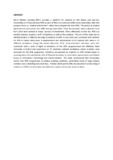Please use this identifier to cite or link to this item:
https://cris.library.msu.ac.zw//handle/11408/1338Full metadata record
| DC Field | Value | Language |
|---|---|---|
| dc.contributor.author | Makuvaro, Veronica | - |
| dc.contributor.author | Ngara, Rosemary | - |
| dc.contributor.author | Magwa, Simuforosa | - |
| dc.date.accessioned | 2016-05-17T07:09:36Z | - |
| dc.date.available | 2016-05-17T07:09:36Z | - |
| dc.date.issued | 2015 | - |
| dc.identifier.issn | 2321-1091 | - |
| dc.identifier.uri | http://cirworld.com/index.php/jssr/article/view/1306 | - |
| dc.description.abstract | Work Related Learning (WRL) provides a platform for students to link theory and practice. Universities in Zimbabwe have WRL as part of their curricula and whilst some universities refer this programme to as "student attachment", others have adopted the term WRL. The period of student placement at work places may differ among universities. There has however, been a general move from short term periods to longer periods of attachment. When effectively carried out, WRL can benefit students, academic staff / institutions as well as the employer. The aim of this study was to identify barriers to effective learning of students on WRL. A case study was conducted with students on WRL in Gweru urban area. A questionnaire was administered to 50 students who were at 15 different workplaces during the period May-June 2014. Semi-structured interviews were also conducted with a total of eight co-ordinators of the WRL programmesat the Midlands State University in Gweru and supervisors at 12 randomly selected workplaces where students were seconded for the WRL programme. Problems encountered by students on WRL include delays in securing places for attachment, lack of financial incentives to meet basic requirements and limited access to Information Technology and Communication. The study recommends that Universities revisit their WRL programmes to address existing conditions, particularly those of large student numbers and a dwindling industrial base. Policies which permit effective placement and learning of students on WRL at both private and public work-places should also be put in place. | en_US |
| dc.language.iso | en | en_US |
| dc.publisher | The International Society for the Social Studies | en_US |
| dc.relation.ispartofseries | Journal of Social Science Resarch;Vol. 7, no. 1 | - |
| dc.subject | Work related learning | en_US |
| dc.subject | Students | en_US |
| dc.subject | Barriers | en_US |
| dc.subject | Revisiting of WRL programmes | en_US |
| dc.title | Barriers to effective learning by university students on work related learning: A case study of Gweru urban area in the Midlands Province of Zimbabwe | en_US |
| dc.type | Article | en_US |
| item.openairecristype | http://purl.org/coar/resource_type/c_18cf | - |
| item.cerifentitytype | Publications | - |
| item.openairetype | Article | - |
| item.fulltext | With Fulltext | - |
| item.languageiso639-1 | en | - |
| item.grantfulltext | open | - |
| Appears in Collections: | Research Papers | |
Files in This Item:
| File | Description | Size | Format | |
|---|---|---|---|---|
| Work Related Learning.pdf | 199.3 kB | Adobe PDF |  View/Open |
Page view(s)
86
checked on Jul 25, 2024
Download(s)
124
checked on Jul 25, 2024
Google ScholarTM
Check
Items in MSUIR are protected by copyright, with all rights reserved, unless otherwise indicated.



